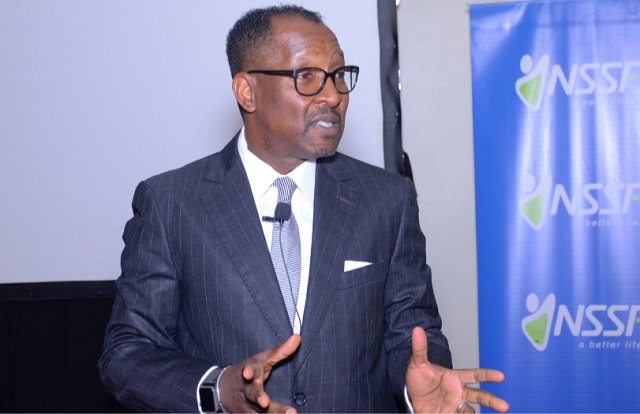
Kampala, Uganda | THE INDEPENDENT | The National Social Security Fund Amendment Bill, 2019 is discriminatory to employees in the informal sector, according to the Private Sector Foundation Uganda-PSFU. PSFU notes with the concern that the bill only provided for mandatory contributions for employees and employers in the formal sector. The foundation wants the bill amended to provide for the mandatory contribution of employees and employers in the informal sector to the National Social Security Fund-NSSF.
The PSFU Executive Director, Gideon Badagawa made the proposal as part of their views on the NSSF Bill, which is being scrutinized by the joint Finance and Gender Committee. The Bill seeks to amend the NSSF Act 1985 to cater for the expansion of NSSF coverage through mandatory contribution from all firms that have employees, not a minimum of five workers, provide for midterm access to benefits for only voluntary members and to tax benefits of savers who withdraw before attaining the age of 60 years.
Badagawa argues that while the Bill removes the restriction on employers with less than five employees to contribute to long term savings and expands coverage beyond formal to informal enterprises, it only provides for voluntary contributions by people in the informal sector.
He says that the NSSF Act and the Bill don’t consider the need to include mandatory contributions from the self-employed people or those in the informal sector with about 15 million people compared to about 4 million workers in the formal sector.
Out of the 4 million workers in the formal sector, 500,000 are civil servants who don’t contribute to the mandatory savings. Badagawa says that the PSFU, with 250 members, and the private sector is interested in the Bill because it has the potential to make NSSF a source for cheap loans of less than 10 percent for long term investments that cannot be supported by the limited financial market.
He noted that NSSF has assets of Shillings 11.3 trillion out of the shillings 30 trillion in the financial market, arguing if all its members were active it would have assets of about Shillings 55 trillion, which would benefit farmers who are impeded by high commercial bank interest rates.
The PSFU Senior Private Sector Development Officer, Eric Sempambo, says the private sector appreciates the provision to expand coverage but it must also consider workers from the informal sector to make mandatory contributions.
He argues that 15 million workers out of a total of 19 million workers in Uganda are in the informal sector, adding that introducing mandatory contributions for workers in the informal and formal sectors will result in more savings managed by NSSF.
Sempambo also notes that self-employed people should be included under mandatory contributions to supplement the voluntary contributions.
The Finance Committee chairperson, Henry Musasizi who is also Rubanda East County MP and Workers Representative, Sam Lyomoki asked Badagawa and his team on the implications and how NSSF can enforce mandatory contributions from the informal sector for example Boda boda riders.
The representative for Persons with Disabilities, Alex Ndeezi asked how workers on private farms, homes or rural areas will make mandatory contributions to NSSF.
Badagawa said there is need for a law that makes it mandatory for all businesses and employers to register with Uganda Registration Services Bureau-URSB and local governments as well as form associations so that they are known to government and NSSF.
PSFU also wants MPs to remove the tax provision on member benefits to attract more people to the saving blanket. In an interview with Uganda Radio Network-URN, Badagawa said the provision should only apply to NSSF benefits and not the entire pension sector.
*****
URN
 The Independent Uganda: You get the Truth we Pay the Price
The Independent Uganda: You get the Truth we Pay the Price



